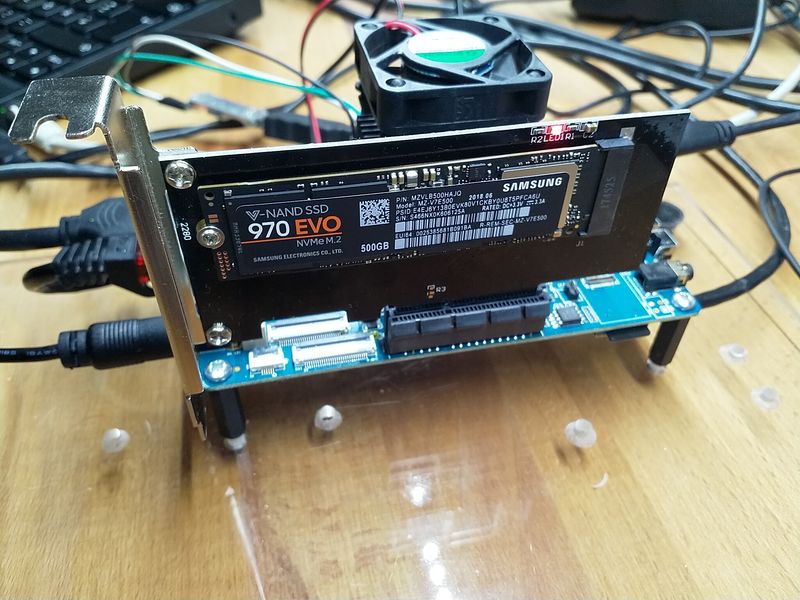Mal ein Test was der Speicher so kann.
rock64@rockpro64:~/tinymembench$ ./tinymembench
tinymembench v0.4.9 (simple benchmark for memory throughput and latency)
==========================================================================
== Memory bandwidth tests ==
== ==
== Note 1: 1MB = 1000000 bytes ==
== Note 2: Results for 'copy' tests show how many bytes can be ==
== copied per second (adding together read and writen ==
== bytes would have provided twice higher numbers) ==
== Note 3: 2-pass copy means that we are using a small temporary buffer ==
== to first fetch data into it, and only then write it to the ==
== destination (source -> L1 cache, L1 cache -> destination) ==
== Note 4: If sample standard deviation exceeds 0.1%, it is shown in ==
== brackets ==
==========================================================================
C copy backwards : 2812.7 MB/s
C copy backwards (32 byte blocks) : 2811.9 MB/s
C copy backwards (64 byte blocks) : 2632.8 MB/s
C copy : 2667.2 MB/s
C copy prefetched (32 bytes step) : 2633.5 MB/s
C copy prefetched (64 bytes step) : 2640.8 MB/s
C 2-pass copy : 2509.8 MB/s
C 2-pass copy prefetched (32 bytes step) : 2431.6 MB/s
C 2-pass copy prefetched (64 bytes step) : 2424.1 MB/s
C fill : 4887.7 MB/s (0.5%)
C fill (shuffle within 16 byte blocks) : 4883.0 MB/s
C fill (shuffle within 32 byte blocks) : 4889.3 MB/s
C fill (shuffle within 64 byte blocks) : 4889.2 MB/s
---
standard memcpy : 2807.3 MB/s
standard memset : 4890.4 MB/s (0.3%)
---
NEON LDP/STP copy : 2803.7 MB/s
NEON LDP/STP copy pldl2strm (32 bytes step) : 2802.1 MB/s
NEON LDP/STP copy pldl2strm (64 bytes step) : 2800.7 MB/s
NEON LDP/STP copy pldl1keep (32 bytes step) : 2745.5 MB/s
NEON LDP/STP copy pldl1keep (64 bytes step) : 2745.8 MB/s
NEON LD1/ST1 copy : 2801.9 MB/s
NEON STP fill : 4888.9 MB/s (0.3%)
NEON STNP fill : 4850.1 MB/s
ARM LDP/STP copy : 2803.8 MB/s
ARM STP fill : 4893.0 MB/s (0.5%)
ARM STNP fill : 4851.7 MB/s
==========================================================================
== Framebuffer read tests. ==
== ==
== Many ARM devices use a part of the system memory as the framebuffer, ==
== typically mapped as uncached but with write-combining enabled. ==
== Writes to such framebuffers are quite fast, but reads are much ==
== slower and very sensitive to the alignment and the selection of ==
== CPU instructions which are used for accessing memory. ==
== ==
== Many x86 systems allocate the framebuffer in the GPU memory, ==
== accessible for the CPU via a relatively slow PCI-E bus. Moreover, ==
== PCI-E is asymmetric and handles reads a lot worse than writes. ==
== ==
== If uncached framebuffer reads are reasonably fast (at least 100 MB/s ==
== or preferably >300 MB/s), then using the shadow framebuffer layer ==
== is not necessary in Xorg DDX drivers, resulting in a nice overall ==
== performance improvement. For example, the xf86-video-fbturbo DDX ==
== uses this trick. ==
==========================================================================
NEON LDP/STP copy (from framebuffer) : 602.5 MB/s
NEON LDP/STP 2-pass copy (from framebuffer) : 551.6 MB/s
NEON LD1/ST1 copy (from framebuffer) : 667.1 MB/s
NEON LD1/ST1 2-pass copy (from framebuffer) : 605.6 MB/s
ARM LDP/STP copy (from framebuffer) : 445.3 MB/s
ARM LDP/STP 2-pass copy (from framebuffer) : 428.8 MB/s
==========================================================================
== Memory latency test ==
== ==
== Average time is measured for random memory accesses in the buffers ==
== of different sizes. The larger is the buffer, the more significant ==
== are relative contributions of TLB, L1/L2 cache misses and SDRAM ==
== accesses. For extremely large buffer sizes we are expecting to see ==
== page table walk with several requests to SDRAM for almost every ==
== memory access (though 64MiB is not nearly large enough to experience ==
== this effect to its fullest). ==
== ==
== Note 1: All the numbers are representing extra time, which needs to ==
== be added to L1 cache latency. The cycle timings for L1 cache ==
== latency can be usually found in the processor documentation. ==
== Note 2: Dual random read means that we are simultaneously performing ==
== two independent memory accesses at a time. In the case if ==
== the memory subsystem can't handle multiple outstanding ==
== requests, dual random read has the same timings as two ==
== single reads performed one after another. ==
==========================================================================
block size : single random read / dual random read
1024 : 0.0 ns / 0.0 ns
2048 : 0.0 ns / 0.0 ns
4096 : 0.0 ns / 0.0 ns
8192 : 0.0 ns / 0.0 ns
16384 : 0.0 ns / 0.0 ns
32768 : 0.0 ns / 0.0 ns
65536 : 4.5 ns / 7.2 ns
131072 : 6.8 ns / 9.7 ns
262144 : 9.8 ns / 12.8 ns
524288 : 11.4 ns / 14.7 ns
1048576 : 16.0 ns / 22.6 ns
2097152 : 114.0 ns / 175.3 ns
4194304 : 161.7 ns / 219.9 ns
8388608 : 190.7 ns / 241.5 ns
16777216 : 205.3 ns / 250.5 ns
33554432 : 212.9 ns / 255.5 ns
67108864 : 222.3 ns / 271.1 ns




